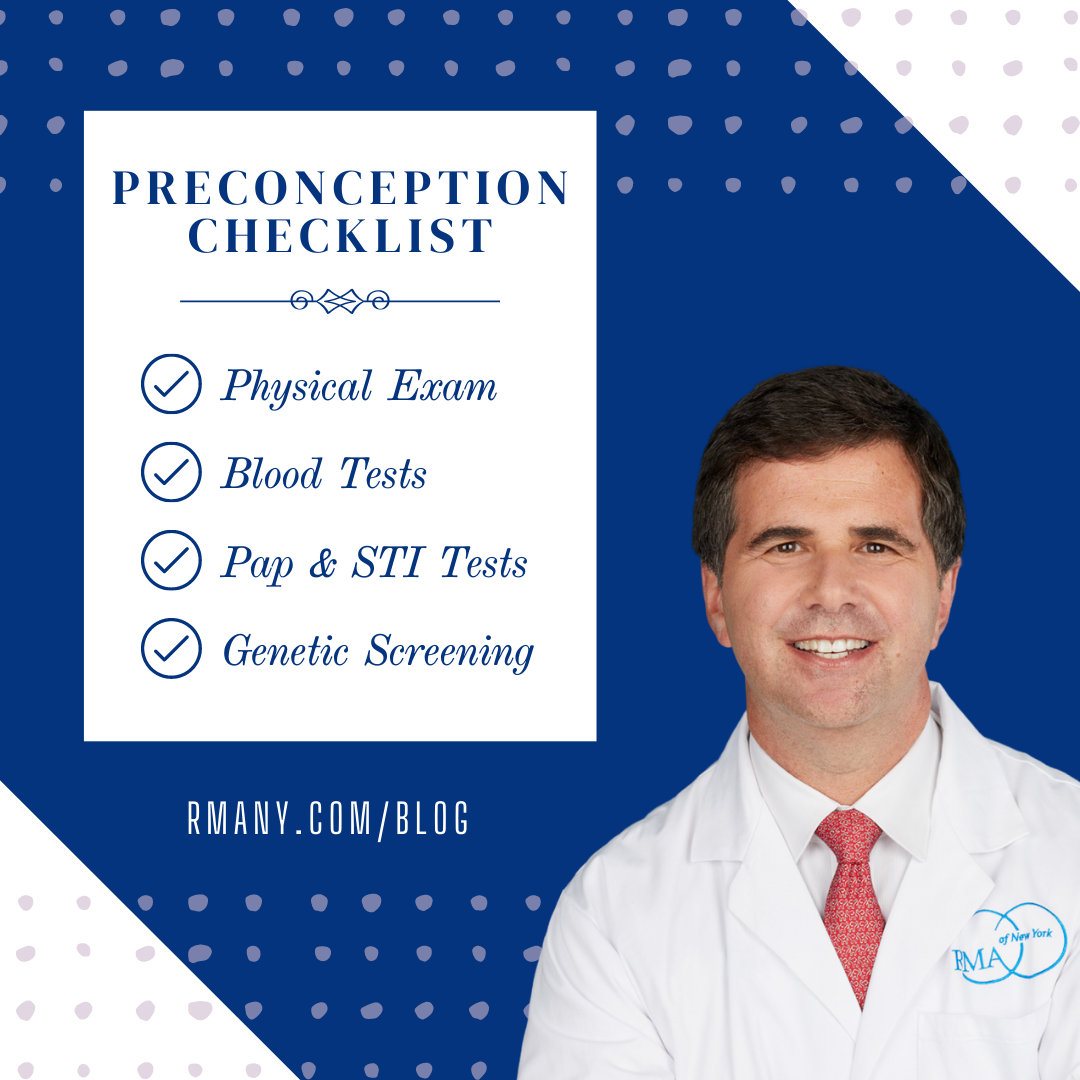Preconceptual Testing

If you and your partner are considering becoming pregnant, your physician may recommend a variety of preconception tests prior to conception. Such testing increases the likelihood of having a healthy parent and a healthy baby. The goal of preconception testing is to identify health issues that could affect the pregnancy.
Preconception testing includes a variety of tests that range from standard blood tests to more detailed genetic screening. (1) Over the past decade, genetic screening has become more accessible and accurate to patient due to advancements in technology. (2) We focus on the different types of preconception tests that you can take advantage of throughout your pre-pregnancy journey. At the end of reading this, you will be more prepared to go into a preconception discussion with your physician and position yourself to undergo the best fertility treatment plan that will give you the best chances of conceiving a healthy baby.
Preconception testing often includes a physical examination, routine blood tests, and a Pap smear, all of which you are most likely to be familiar with. Blood tests will determine whether you have any underlying health conditions that need to be addressed prior to conception, such as HIV and Hepatitis B or C, and will also determine immunity to rubella. (3) It is important to be vaccinated against rubella prior to conception, as contracting this virus during pregnancy can impact the health of your baby. Cervical cultures and urine tests are also used to test for sexually transmitted infections that could impede your ability to conceive. (4)
In addition to this routine “check-up”, your physician will seek to better understand your lifestyle. This is particularly important in the months leading up to your expected conception, as ingesting the appropriate vitamins through supplements (specifically folic acid, as it is required for growth and development of the fetus) and every-day diet is critical to supporting a healthy pregnancy. (5) In addition to dietary considerations, your physician will likely emphasize the importance of maintaining a healthy exercise schedule and addressing risks associated with using substances that could impact your pregnancy, such as alcohol, cigarettes, and recreational drugs. (6)
An important step in the preconception testing process involves genetic screening, also known as carrier screening. Carrier screening provides a glimpse into the genetics of both partners. Carrier screening can provide important information that can be valuable in assessing the overall risk of passing a heritable trait to your future child. Inherited disorders may include cystic fibrosis, Fragile X syndrome, and sickle cell disease, among others. (7) If you and your partner are carriers of a genetic disorder, there are options available throughout your fertility treatment that can drastically reduce the chances of passing these diseases to your future offspring. (8)
One option that can reduce the possibility of passing on a genetic disorder to your future offspring is to utilize preimplantation genetic testing. Preimplantation genetic testing allows for patients to screen their embryos with IVF prior to implantation, decreasing the risk of passing these disorders onto their children. You may also opt to get pregnant and subsequently use prenatal diagnostic tests to see if the fetus has the disorder. (7) Though the majority of tests are negative (i.e., fetus does not have the disorder specifically tested for), if both members of a couple carry the mutation in a gene causing a recessively inherited disease, the result will be positive (i.e., fetus has the disorder specifically tested for). In this rare event, your genetic counselor or obstetrician will be prepared to provide further guidance. (9)
It is important to remember that preconceptual testing is meant to provide support to you and your partner before conception and throughout pregnancy. Your obstetrician, genetic counselor, and any other reproductive specialist included in this journey are keeping you and your baby’s best interest in mind and will provide continuous counseling on how to best approach potential risks that arise throughout the screening process and enable you to feel empowered over the uncertainties you may feel prior to becoming pregnant.
Resources
- Chronopoulou, E., Seifalian, A., Stephenson, J., Serhal, P., Saab, W., & Seshadri, S. (2020). Preconceptual care for couples seeking fertility treatment, an evidence-based approach. Fertility and sterility, 2(1), 57-74.
- Krstic, N., & Obican, S. G. (2020) Current landscape of prenatal genetic screening and testing. Birth defects research, 112(4), 321-331.
- Jack, B. W., Atrash, H., Coonrod, D. V., Moos, M. K., O’Donnell, J., & Johnson, K. (2008). The clinical content of preconception care: an overview and preparation of this supplement. American journal of obstetrics and gynecology, 119(6), S266-S279.
- Moos, M. K., Dunlop, A. L., Jack, B. W., Nelson, L., Coonrod, D. V., Long, R., Boggess, K., & Gardiner, P. M. (2008) American journal of obstetrics and gynecology, 199(6), S280-S289.
- Greenberg, J. A., Bell, S. J., Guan, Y., & Yu, Y. H. (2011). Folic acid supplementation and pregnancy: more than just neural tube defect prevention. Reviews in obstetrics and gynecology, 4(2), 52-59.
- Reproductive Medicine Associates of New York. (2021). Preconception counseling.
- American College of Obstetricians and Gynecologists. (2020). Preconception carrier screening.
- Harris, B. S., Bishop. K. C., Kuller, J. A., Alkilany, S., & Price, T. M. (2021) Preimplantation genetic testing: a review of current modalities. Fertility and sterility, 2(1), 43-56.
- American College of Obstetricians and Gynecologists. (2020). Prenatal genetic diagnostic tests.
